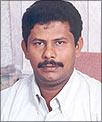Every day, nearly 20 million Indians buy lottery tickets issued by state governments across the country. Yet, you will rarely come across ordinary people who have become millionaires by buying these tickets.
Senior Associate Editor
George Iype steps into this murky world to find out how government-run lotteries ruin the poor and make the scamsters rich.

Santiago Martin
|
Welcome to the world of Santiago Martin. This 40-year-old Coimbatore-based lottery agent earns more money every day than new economy czar N R Narayana Murthy or old economy titan Dhirubhai Ambani.
Every day, Martin sells -- through his Martin Lottery Agencies -- some 12 million lottery tickets across the country. He is the sole distributor for 28 Sikkim government lottery schemes, 17 Tamil Nadu schemes and six Arunachal Pradesh schemes.
He is the sub-distributor for the Bhutan government lotteries as also for many state governments like Manipur, Meghalaya, Nagaland and West Bengal.
Every day, Martin pays Rs 350,000 to the Tamil Nadu government as sales tax, which translates into Rs 130 million each year.
He pays the Sikkim government a daily advance of Rs 759,000.
The West Bengal government, too, gets an advance of Rs 50,000 from Martin every day.
Twenty-six years ago, Martin was a shopowner in Coimbatore whose main income came from selling lottery tickets. "I succeeded because I grasped the psychology of the buyer and the tricks of the trade," says Martin. "I also steered cleared of the gambling type of lotteries."

Martin's offices at Madras
and Coimbatore
|
Today, Martin has posh offices in Madras and Coimbatore. His company employs 310 people and has 350 stockists across the country. He is officially listed as an advisor to the Sikkim government. On a conservative estimate, his business generates anything between Rs 60 million to Rs 80 million every day. This is huge money, as huge as the business he is involved in.
Martin says his success with lotteries came in 1991 after he shut down his shop and set up the Martin Lottery Agencies in Coimbatore to distribute the Tamil Nadu government's lottery tickets. He never looked back. Today, he is the undisputed king of India's lottery trade. In the northeastern states in particular, Martin has more influence than, perhaps, many ministers.
Those who know him say that in his personal life Martin practises the creed of high thinking and simple living and devotes himself to the development of his core business. He is the treasurer of the All India Federation of Lottery Trade and Allied Industries. Six months ago, he travelled to Newport, Rhodes Island, in the United States, to receive the coveted 'Distinguished Lottery Professional Award' from the Public Gaming Research Institute.
So far, so good.
Everything about Martin's success story seems above board and too good to be true. The only worm in the apple is an on-going investigation of Martin and his company by the income tax department.
A senior IT official, speaking on condition of anonymity, goes as far as to state, "We have sufficient evidence to prove how ordinary people are being cheated by big-time lottery operators. We will soon pass the files to the Central Bureau of Investigation."
The charges listed against Martin include:
- His company bribed officials of state governments like Sikkim to ensure that prizes are announced on unsold tickets. Rules stipulate that the unsold tickets should be returned to state government lottery departments. But agencies like the MLA do not return tickets. The result: millions of rupees are won by the agent himself.
- In June 1997, Martin's son Charles won Rs 5 million on the Azad Hind Bumper Lottery run by the Nagaland government. Martin claims his son had bought that particular ticket. But IT officials allege the draw was cleverly fixed with the connivance of officials.
- In April 2000, the 10 fourth prize winning digits of the Sikkim Yellow Weekly and the Bhutan Kalpataru Lottery -- the two most popular lotteries distributed by MLA -- were identical. Officials say it is a clear example of how lottery draws are regularly rigged.
- The home ministry has obtained a number of documents that detail the business links between Martin and Moni Kumar Subha, the Congress member of Parliament from Tezpur in Assam.
Subha is Nagaland's lottery king. Officials allege the duo have joined hands to fix all the lotteries in the northeastern states.
|
According to documents which the ministry has forwarded to the Chief Vigilance Commissioner and the CBI, there is large-scale fixing of draws in Arunachal Pradesh, Mizoram and Sikkim because most lottery tickets from these states do not sell in the states of their origin. "Nobody witnesses the draw which is held in distant places. Officials and agents regularly fix the draws. And the people believe what appears in newspapers," says the afore-quoted IT officer.
Some months ago, the director of lotteries in Himachal Pradesh sent an official note to the home ministry in which he accused the big lottery agents of 'perpetuating some improper practices' in the trade. 'They are able to dictate terms in any lottery tender. The cash-starved states are thus browbeaten into falling in line.'
Armed with reports showing how state-sponsored lotteries cheat the poor, the home ministry has been trying to draft a bill to ban all lotteries in the country.
Martin and his associates, on the other hand, allege that rivals -- jealous of their success -- have joined hands with some Bharatiya Janata Party members of Parliament to torpedo his growing business.

John Brito
|
John Brito, Martin's brother-in-law and MLA's general manager, specifically accuses Chandni Chowk MP Vijay Goel of indulging in foul play. Goel, alleges Brito, used to be the Sikkim government's main supplier of paper for lottery tickets. "After we got the Sikkim government lottery contracts, we changed the supplier. It is because of this that he is instigating the government with false cases about us."
Martin's associates also allege that Ashwani Khurana, owner of the Delhi-based lottery agency K & Co, is colluding with Goel. "Khurana wanted the Sikkim lotteries contract, but we won it last year. Besides, a powerful section of our business rivals, parliamentarians and politicians are trying to finish us off because we, who hail from the south, have emerged the biggest lottery agency in the country," claims an MLA auditor.
Goel denies these charges, but refuses to answer any questions about whether he was the main supplier of lottery printing paper to the Sikkim government. "The lottery business is today the single biggest financial scam in India. The government has no control over it and some unscrupulous operators are fooling the people," says the MP. "Every day, thousands of poor people are looted of their prize money as corrupt officials and operators fix the draws."
Whether Martin's charges are true or not, Goel has been campaigning to cleanse the lottery business for some years now. It was because of his sustained crusade that the government banned the single digit lottery in the country.

Vijay Goel
|
"It is a scam-ridden business," says Goel. "I feel all forms of lotteries should be immediately banned in the country." It is a decision that has been debated by Parliament's standing committee on home affairs for the last four years.
For the man on the street, who pays Rs 5 to Rs 10 to buy a lottery ticket in the hope of winning those millions, the dream continues to remain elusive.
Part II: The devastation of ordinary lives
Part III: Can lotteries be banned?
The Rediff Specials
Do tell us what you think of this special report
